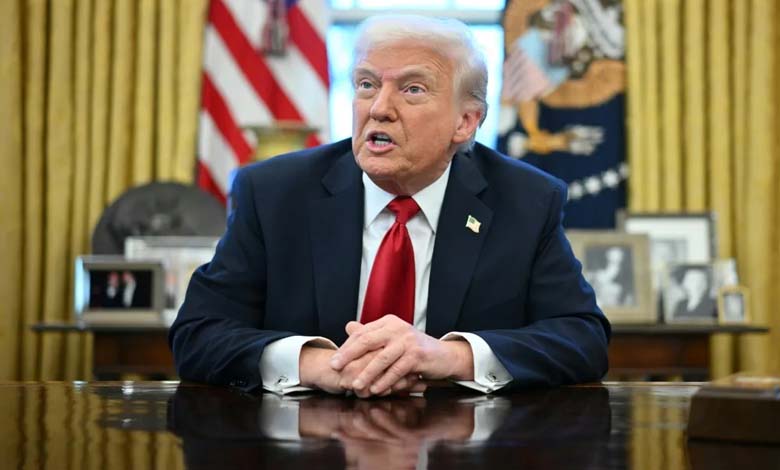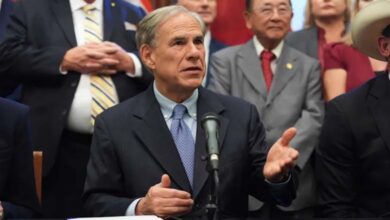Why Can’t Trump Be Elected for a Third Term?

For months, former U.S. President Donald Trump and his allies have been discussing the possibility of a third term for the twice-elected leader.
Last Saturday, Trump reaffirmed this idea, stating that he was “not joking” about another presidential term.
-
The Week of Reckoning in America… Trump’s Loyalty Philosophy under Scrutiny
-
Trump Gives Iran Two Months to Negotiate a New Nuclear Deal
Can Trump Run for a Third Term?
According to the news site “Axios,” the 22nd Amendment to the U.S. Constitution prohibits presidents from seeking a third term. Since amending the Constitution is a long and difficult process, any attempt by Trump to change this rule is unlikely to succeed.
However, Trump told “NBC News” that there are “ways” he could return to office.
What Are These Ways, and Are They Feasible?
According to “Axios,” it is nearly impossible for two-thirds of Congress and three-quarters of U.S. states to vote in favor of repealing the 22nd Amendment.
-
A 40-Year-Old Secret… Was Trump a KGB Spy?
-
When the “Riviera” Clashes with Resilience: Trump’s Vision for Gaza Between Benefit and Identity
Another option would be for two-thirds of U.S. states to call a constitutional convention to propose an amendment, but 38 out of 50 states would still need to ratify it, making this approach highly unlikely.
White House Communications Director Steven Cheung told “Axios” that Trump believes it is “far too early to consider” a third term.
However, legal experts take his remarks seriously. Kimberly Wehle, a law professor at the University of Baltimore and constitutional law expert, questions: “Why does the 22nd Amendment exist if it is ineffective?”
She adds: “If it’s all just a game that can be circumvented through complex legal maneuvers, then that is neither a legitimate nor an ethical stance.”
-
Trump’s Gaza Storm: Arab Initiative Seeks an Alternative to Halt Forced Displacement
-
Trump Promotes a New Nuclear Deal with Iran to Avoid Military Option
What Does the 22nd Amendment Say?
The 22nd Amendment states that “no person shall be elected to the office of the President more than twice.”
- It was proposed in 1947 after the death of President Franklin D. Roosevelt, who had been elected to a fourth term.
- It was ratified in 1951.
- It places limits on individuals assuming the presidency, particularly in cases where a president dies before completing their term.
- If a vice president assumes the presidency for more than two years of an unfinished term, they can only run for election once.
-
Trump Reinstates Cuba on ‘Terrorism Sponsors’ List… Cuban President Responds
-
The Capitol Case: Trump’s Fate if He Was Not Elected President
Could Trump Circumvent This Rule with J.D. Vance?
One potential strategy involves modifying the 2024 election timeline so that J.D. Vance, his running mate, becomes president while Trump serves as vice president.
Once in office, Vance could then resign, allowing Trump to assume the presidency for a third term.
Some experts argue that whether a twice-elected president can serve a third term via promotion from vice president hinges on how the 22nd Amendment is interpreted. The amendment prohibits a person from being “elected” more than twice but does not explicitly state whether they can “serve” more than twice.
-
Trump’s Rise Prompts Iran to Consider the Consequences of a Potential Attack on Israel
-
“I’m Crazy”… Trump’s Foreign Policy Doctrine “Scares the World”
Bruce Peabody, a professor at Fairleigh Dickinson University, explains that the 22nd Amendment primarily prevents twice-elected presidents from returning to office via elections.
However, others point to the 12th Amendment, which states that “no person constitutionally ineligible to the office of President shall be eligible to that of Vice-President,” suggesting this could prevent a twice-elected president from serving as vice president. Peabody calls this an “important argument.”
-
“Enemy Within”: Trump’s Generals Turn Against Him
-
Trump receives intelligence report on “Iranian threats” to assassinate him
Could Trump Attempt a Power Grab?
The question remains: Is a twice-elected president merely ineligible for election, or also for serving another term?
“Axios” notes that if Trump were to appear on state ballots for a third term—whether as president or vice president—lawsuits would immediately follow.
This scenario echoes a recent Supreme Court ruling that prevented Colorado from barring Trump from its primary elections, asserting that Congress, not individual states, is responsible for enforcing the 14th Amendment’s insurrection clause.
-
Trump’s Proposed Plan to End the Ukraine War: Key Details, Including a “Demilitarized Zone”
-
Despite the “Donation Comeback”… Cracks in Trump’s Campaign
Finally, “Axios” suggests Trump could interfere with the presidential transition process.
Kimberly Wehle concludes: “If he doesn’t follow the Constitution and believes, for whatever reason, that he should remain in power, the big question is: Who will stop him?”












